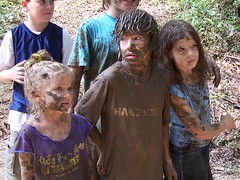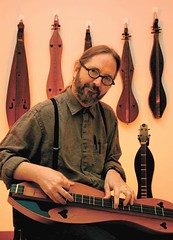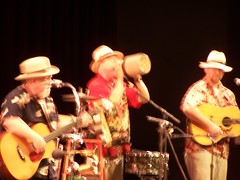
Muddy Kids
Originally uploaded by paynehollow.

David Schnaufer, a musician who revived the use of the
dulcimer in country music and taught the instrument to many students, died Wednesday of cancer at a local hospice. He was 53.
Schnaufer recorded with The Judds, Johnny Cash, June Carter Cash, Kathy Mattea, Mark Knopfler, Emmylou Harris, Chet Atkins and many others on dulcimer, a gentle stringed instrument used in Appalachia since the 1800s, derived from zithers brought into North America by German immigrants in the 17th and 18th centuries.
"Anybody can make beautiful music in five minutes of playing the dulcimer," Schnaufer often said. "It’s the simplest of all the stringed instruments, but can be as complex as anything else.
Photo from Vanderbilt University, where Schnaufer taught

Father Neo recently asked some questions about why our nation seems so divided. There appears to be an ever-increasing chasm between what we might call the Left and the Right (although the terms are fluid and sometimes not useful) – is this divide real? Is it serious? Why is it there?
These are good questions to ask. My response:
1. It is on the surface, a good thing that we have these differences between us. We have this chasm because we are striving to oppose injustice, oppression – in short, what I’ll call “evil.”
The Bush-types out there perceive there to be a great threat from “terrorists” which some have defined as “Islamo-fascists.” And there ARE those out there who’d harm innocent people and standing in opposition to them is a good thing.
Those who distrust Bush and his invasion of Iraq do so because they believe Bush’s actions are possibly illegal and that they encourage, not discourage terrorism. And standing in opposition to that which is illegal and which would encourage terrorism is also good thing.
And so, this desire to set our faces against evil is a good, wholesome desire. BUT…
2. From there, too many of us have decided that because we’re standing against evil, those who disagree with us must be standing in support of evil.
3. And from there, it becomes relatively easy for many of us to speak ill of They That Support Evil, to twist their words (“He said he doesn’t trust Bush’s leadership. He obviously hates America!” “She said that it’s a good idea to try to understand WHY the terrorists are acting like they do. She obviously supports terrorism!”) - EVEN if the twisted words are patently false – and to generally demonize the enemy.
4. Once we’ve accepted that the “other side” are not merely brothers and sisters with whom we have a disagreement over vital issues, but they are in fact monsters or monster-supporters, then they become less than human.
5. Once the enemy is less than human, it becomes all that much easier to further twist their words and demonize them and even want to see them stopped, even with violence, EVEN with deadly violence. EVEN deadly violence that kills innocent bystanders in the process.
And so, even though the initial starting place of opposing evil is a good, if we allow that opposition to begin to allow us to demonize the other side, then we have taken steps down a twisted path that can lead to terrorism, that can lead to evil, that can lead to becoming that very thing which we had hoped to oppose to begin with.
Standing in opposition to evil is vital, but HOW we do so is more vital, yet.
What say ye?

Did you know that Jug Band music originated in Louisville, KY?
The Bush administration has drafted amendments to a war crimes law that would eliminate the risk of prosecution for political appointees, CIA officers and former military personnel for humiliating or degrading war prisoners, according to U.S. officials and a copy of the amendments.
Officials say the amendments would alter a U.S. law passed in the mid-1990s that criminalized violations of the Geneva Conventions, a set of international treaties governing military conduct in wartime. The conventions generally bar the cruel, humiliating and degrading treatment of wartime prisoners without spelling out what all those terms mean....
The risk of possible prosecution of officials, CIA officers and former service personnel over alleged rough treatment of prisoners arises because the Bush administration, from January 2002 until June, maintained that the Geneva Conventions' protections did not apply to prisoners captured in Afghanistan...